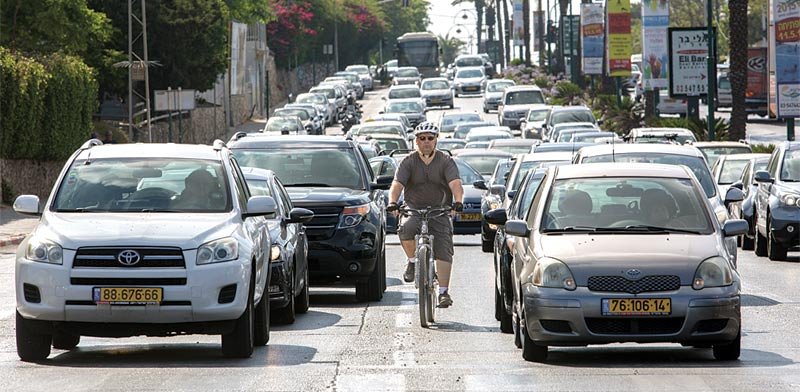2018 was an excellent year for vehicle taxes in Israel. According to annual review of the auto sector in 2018 published today by the Israel Tax Authority, revenues from purchase taxes on all types of vehicles shot up 20% to NIS 10 billion in 2018. With the addition of import taxes on spare parts, vehicle import taxes for the year totaled NIS 11.1 billion.
The Tax Authority claims that one of the reasons for the steep increase is that there were fewer auto imports in 2017, but the figures show that 2018 was one of the three best years for tax collections on auto purchases and maintenance. According to the Tax Authority's figures, state tax revenues from taxes on auto purchases rose by 32% in the past decade.
According to the review, the average purchase tax on a passenger vehicle in 2018 was NIS 35,000, down 0.8% in real terms, while the average purchase tax rate fell from 59.7% in 2017 to 57.7% in 2018.
These figures, however, are misleading, because imports of hybrid and plug-in vehicles rose sharply in 2018, and especially in 2019, and accounted for over 20% of all imported vehicles sold. Since the purchase tax on these vehicles is substantially lower than the tax on ordinary vehicles, it naturally also pulls down both the purchase tax per passenger vehicle and the average purchase tax. This was one of the reasons for raising the purchase tax on hybrid vehicles by 15%, starting at the beginning of 2020. Once this tax increase goes into effect, the purchase tax rate on a new vehicle is projected to return to the usual rate (in Israel) of 60-70%.
Ministry of Finance: It costs us more
It appears that even the huge amount of taxes collected in 2018 is not enough to satisfy the Ministry of Finance's appetite. The Ministry of Finance argues that it still does not cover the external vehicle usage costs.
On this subject, the review states, "The ratio of vehicle taxes to GDP in Israel and to total tax revenues continues the downtrend that has lasted for two decades. The proportion of tax revenues derived from vehicle taxes in 2018 was 3.7%, and the proportion of revenue derived from import taxes on vehicles was 0.8%. When taxes on fuel for transportation and licensing fees are added, total revenues from taxes on buying and using a vehicle do not cover external costs caused by the use of a vehicle (congestion, accidents, air pollution, noise, road construction and maintenance costs, etc.). Total taxes on vehicles and fuel for transportation are equal to 3% of GDP, while the external costs of a vehicle are believed to equal 6-7% of GDP."
The Ministry of Finance "forgot" to add revenues from taxes on the use of a company car, which are included under general income tax revenues, amounting to NIS 5 billion a year. When these revenues are added, revenue from taxes on the purchase and use of vehicles amounts to nearly 4.5% of GDP, one of the highest figures in the West.
Vehicle fleets: a jump in mileage
Referring to vehicle fleets, the report states that at the end of 2018, there were 311,000 company vehicles, amounting to 9.4% of all active vehicles. 240,000 of the company vehicles were owned by leasing companies. The report nevertheless shows that the proportion of mileage on company vehicles continues to be significantly higher than their proportion of the cars on the road, and has increased.
According to figures from the Ministry of Transport and calculations by the Tax Authority, the average mileage of company passenger vehicles used by employees jumped 16.4% to 28,000 kilometers a year in 2018, significantly higher than the general average of 14,000 kilometers a year for privately owned vehicles. One of the reasons is probably the large number of company vehicles that are hybrid vehicles. According to figures from the Tax Authority, these vehicles average 20% more mileage than ordinary vehicles.
The report reveals that the Tax Authority finds the fact that hybrid vehicles are more economical and therefore generate less revenue from excise taxes on fuel. The report states, "Rapid growth in the number of hybrid vehicles was one of the factors that slowed the increase in tax revenues from excise taxes on fuel, despite the continued rise in the number of vehicles on the roads and the mileage recorded by vehicles. For example, the total mileage of private vehicles was 42% higher than in 2010, while revenues from gasoline excise taxes grew only 34%."
It can be concluded from this that if the spread of electric vehicles on roads in Israel begins to detract substantially from state tax revenues derived from fuel taxes in the medium and long term, the Ministry of Finance will consider measures for significantly increasing the taxes on them.
Finally, the Tax Authority's annual survey also shows the depth of the road congestion problem. According to the Tax Authority's figures, density on Israel's roads in 2018 was 177 vehicles per kilometer, almost 27% higher than at the beginning of the decade.
Related News

